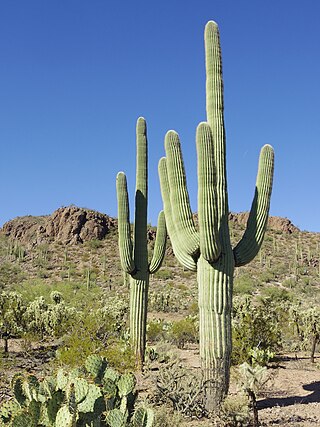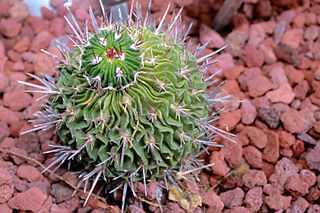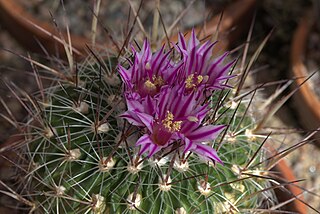
Astrophytum myriostigma, the bishop's cap cactus, bishop's hat or bishop's miter cactus, is a species of cactus native to the highlands of northeastern and central Mexico.

Selenicereus undatus, the white-fleshed pitahaya, is a species of the genus Selenicereus in the family Cactaceae and is the most cultivated species in the genus. It is used both as an ornamental vine and as a fruit crop – the pitahaya or dragon fruit.
Stenocactus pentacanthus is a cactus native to Central Mexico. It can grow to 8 cm in diameter. The plant is greyish-green in colour with 30 to 40 wavy-edge ribs with few areoles. Its flowering period is normally during spring. These flowers can grow to 2 cm long. The flowers are whitish with a pale purple mid-stripe. They enjoy full sun and need a minimum temperature of 10 °C (50 °F).

Myrtillocactus geometrizans is a species of cactus in the genus Myrtillocactus, native to central and northern Mexico.

Ferocactus viridescens is a species of flowering plant in the cactus family Cactaceae. This barrel cactus is known by several common names, including coast barrel cactus, keg cactus and San Diego barrel cactus. Most of its native range in the United States is in San Diego County, California, where it is threatened by development, agriculture, and other alterations in its habitat. It is also found in northern Baja California, Mexico.

The saguaro is a tree-like cactus species in the monotypic genus Carnegiea that can grow to be over 12 meters tall. It is native to the Sonoran Desert in Arizona, the Mexican state of Sonora, and the Whipple Mountains and Imperial County areas of California. The saguaro blossom is the state wildflower of Arizona. Its scientific name is given in honor of Andrew Carnegie. In 1933, Saguaro National Park, near Tucson, Arizona, was designated to help protect this species and its habitat.

Ferocactus pilosus, also known as Mexican lime cactus or Mexican fire barrel, is a species of cactus in North America.

Echinocereus stramineus is a species of cactus, with stramineus meaning made of straw. There are various common names such as strawberry cactus, porcupine hedgehog cactus, straw-color hedgehog, and pitaya. The straw-colored spines distinguishes this particular plant from other Echinocereus. The aged spines may turn white in color and are very fragile.

Echinocereus arizonicus is a species of cactus native to the Chihuahuan Desert region of Chihuahua, southwestern New Mexico and southeastern Arizona, as well as in the Superstition and Mescal Mountains of Central Arizona at elevations between 1400 and 1900 meters.

Cochemiea conoidea, common name Texas cone cactus or Chihuahuan beehive, is a species of cactus native to southern United States to central Mexico.

Echinocereus pectinatus is a species of hedgehog cactus.

Stenocactus multicostatus, the brain cactus, is a member of the cactus family native to the deserts of Mexico, and is popular in the gardening community. It has gained the Royal Horticultural Society's Award of Garden Merit.

Thelocactus hexaedrophorus is a species of cactus. It is endemic to Mexico.

Thelocactus rinconensis, synonyms including Thelocactus nidulans, is a species of cactus. It is endemic to north-east Mexico.

Thelocactus leucacanthus is a species of cactus. It is endemic to Mexico.

Ferocactus schwarzii is a species of Ferocactus from Mexico.

Echinocereus viereckii is a species of cactus native to Mexico.

Stenocactus crispatus, formerly known as Echinofossulocactus crispatus, is a species of cactus native to the deserts of Mexico. Along with other members of the genus Stenocactus, it is also known as the "brain cactus".

Stenocactus obvallatus is a species of cactus native to the deserts of Mexico.

Stenocactus ochoterenianus is a species of cactus native to the deserts of Mexico.






















